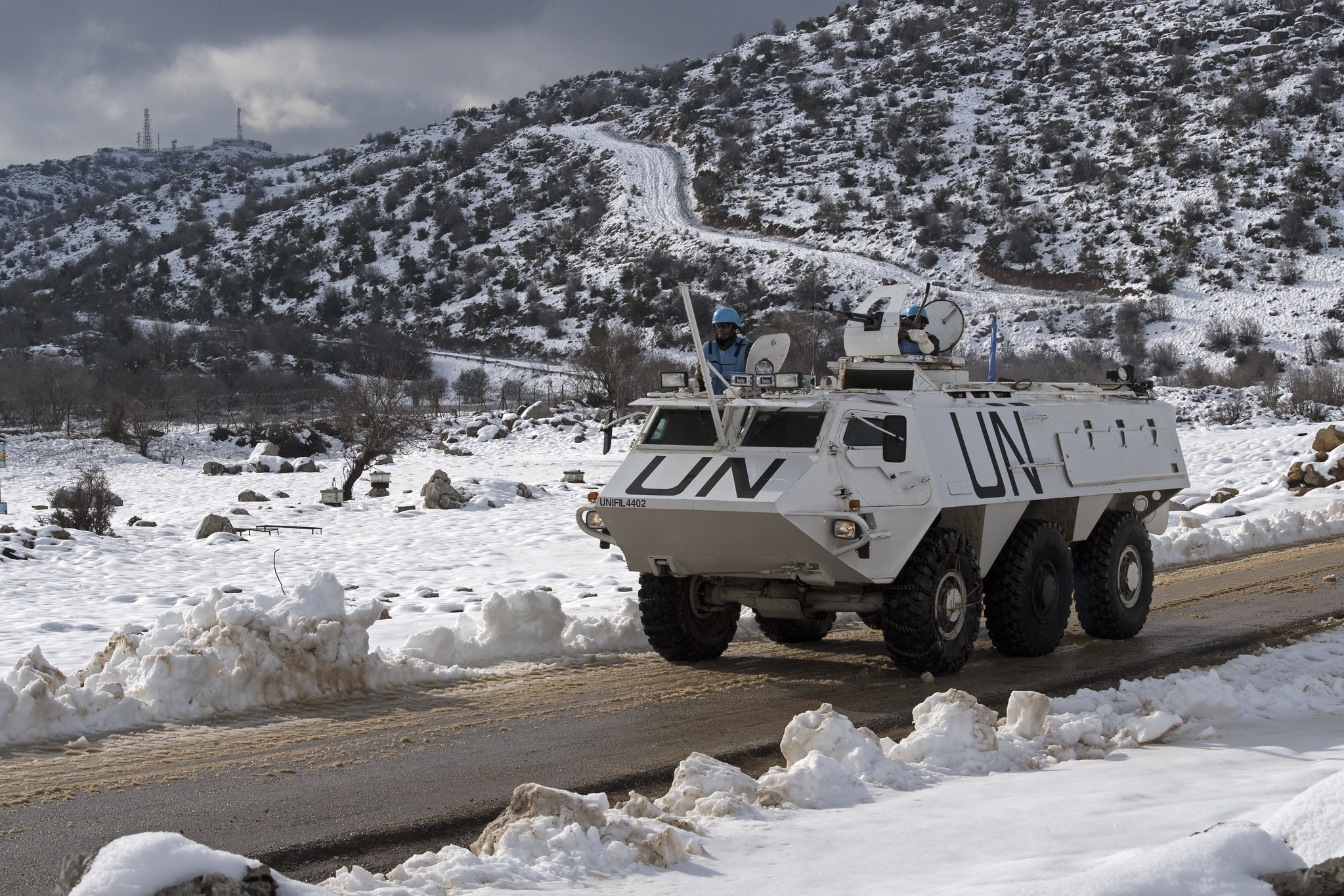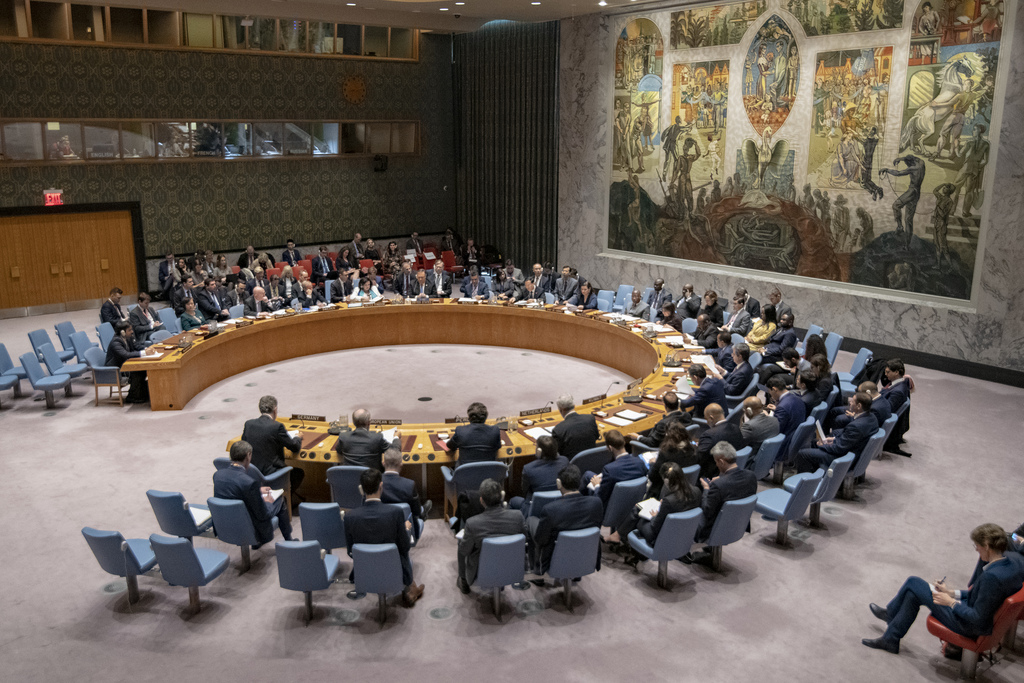Hezbollah terrorists crossed into Israeli territory on July 16, 2006, when they ambushed an Israel Defense Forces’ patrol, killing three soldiers. They then kidnapped two Israeli soldiers before fleeing back into Lebanon. UNIFIL (United Nations Interim Force in Lebanon) was nowhere to be seen. Now, 14 years later, and after numerous other incidents when UNIFIL failed to act even as Hezbollah operated under its very nose, a strong and growing sentiment in Israel and abroad insists that UNIFIL must either change or completely lose its mandate.
A U.N. Security Council vote on extending UNIFIL’s mandate scheduled is for Aug. 31. According to a number of experts, UNIFIL will remain impotent unless it is given a clear mandate to stop Hezbollah terrorists from violating U.N. Resolution 1701 and from attacking Israel.
Eugene Kontorovich, director of international law at the Jerusalem-based Kohelet Policy Forum, said there is now a “golden opportunity to fix UNIFIL’s structural problems from an Israeli standpoint,” adding that “this special opportunity might not return for a long time.”
UNIFIL “is not fulfilling its mandate to disarm Hezbollah,” he said. “Instead, it serves as Hezbollah’s de facto human shield, limiting the IDF’s freedom to maneuver in a potential conflict.”
As U.S. permanent representative Kelly Craft told the U.N. Security Council on May 4, “Hezbollah openly flaunts its weaponry, flagrantly disregards Resolution 1701, [and] dictates to UNIFIL where and when it can patrol. … The time has come to either pursue serious change to empower UNIFIL or to realign UNIFIL’s staffing and resources with tasks it can actually accomplish.”
In a recent paper he published through Kohelet, Kontorovich said UNIFIL, “like other U.N. entities,” is “biased against Israel.”
If the Security Council does not extend UNIFIL’s mandate at the end of the month, its mission will end immediately as their peacekeeping mission will come to an end under U.N. resolutions. UNIFIL’s mandate must be renewed annually by the Security Council and its budget is approved annually by the General Assembly.

‘Diverging views on what should be preserved’
However, according to Kontorovich, “unlike most U.N. agencies, UNIFIL could also be reorganized. The mandate renewal, which cannot happen over a U.S. veto, gives the United States leverage considerable leverage to push for sustainable reforms of the organization. This would be consistent with the Trump administration’s ambitions to shrink and streamline bloated and ineffective peacekeeping missions.”
“Neither the U.S. nor Israel has yet to take advantage of the potential of dismantling or scaling back UNIFIL’s presence,” he said. “The only reform (short of not reauthorizing the mission) that is self-enforcing and can withstand a potential loss of critical scrutiny of UNIFIL by future U.S administrations is a simple reduction of UNIFIL personnel. This will restore the organization to its historic levels and save U.S. taxpayer dollars, while boosting the IDF’s freedom of maneuver, defensive capabilities and reconnaissance abilities in southern Lebanon.”
“Over the years, UNIFIL has proven itself to lack the motivation and ability to prevent violations of U.N. Security Council resolutions concerning Hezbollah and the Lebanese Armed Forces [LAF],” Kontorovich said, listing a few examples as proof.
In the past decade, Hezbollah has dug a series of attack tunnels into Israel territory right under UNIFIL peacekeepers’ noses (Israel destroyed these tunnels in Operation Northern Shield in 2018-2019). In late 2018, during work to demarcate the Blue Line, LAF forces violently blocked UNIFIL peacekeepers for an hour and a half, without provoking a response. More recently in June 2020, Lebanese soldiers were seen aiming an RPG launcher at IDF tanks during routine activity, as UNIFIL troops stood by helplessly between the forces.
“UNIFIL can be dismantled or reformed,” advised Kontorovich. “As its name suggests, UNIFIL was always intended to be temporary, but like many U.N. institutions, it has enjoyed a bureaucratic persistence not justified in any way by its effectiveness, mission success or efficiency.”
This week ahead of the UNIFIL discussion, Israel’s Ambassador to the United Nations Gilad Erdan submitted to the Security Council intelligence photos showing Hezbollah’s latest attempt to infiltrate Israel in late July.
“Hezbollah’s terrorist operations, which violate Security Council resolutions, could lead to disaster and wreak havoc on Lebanon. The role of the UNIFIL force is to prevent these operations and to prevent Hezbollah from turning southern Lebanon into its own terrorist base. If UNIFIL is unable to fulfill this mission, then its existence should be in doubt,” said Erdan.
Assaf Orion, the Liz and Mony Rueven International Fellow with the Washington Institute, told JNS there is “wide common interest” in preserving UNIFIL’s mandate, but “diverging views on what should be preserved.”

Focusing on three positive aspects that UNIFIL’s presence provides, Orion said the force is “useful to defuse escalation” as a result of miscommunication or miscalculation because having a trusted liaison makes a difference during times of high tension—“and UNIFIL is just that,” he said.
A second positive aspect is that if UNIFIL is in the field, it “saves us a lot of misunderstandings, wrong moves and mistakes,” he said. “It needs to be stressed. Above all, what we need to avoid is stumbling into a war.”
Third, Orion said UNIFIL’s presence keeps the Security Council and European nations abreast of the matter.
“They have people on the ground, they devote intelligence assets, and they know what is going on,” he said.
The negative aspects of UNIFIL’s presence, according to Orion, “begins with the construct of U.N. Resolution 1701 and UNIFIL in that improvement is the responsibility of the Lebanese government, through the Lebanese Armed Forces, supported by UNIFIL.”
How to reduce UNIFIL’s impotence
In a paper he wrote for the Institute of National Security Studies, Orion offered a number of suggestions that would significantly improve UNIFIL’s mandate and reduce its impotence.
“Given the systematic procrastination by Lebanon and Hezbollah,” he wrote, “the most important requirement right now is stipulation of an enhanced frequency of Security Council discussions and greater oversight of the evolving situation in Lebanon. Instead of an annual session that ends with a resolution to renew the UNIFIL mandate, along with two periodic resolution-free sessions, the mandate should be renewed for a half-year only (as with UNDOF, the U.N. force on the Golan Heights).”
Orion also suggested that Israel “should support the recommendation by the U.N. secretary-general that UNIFIL be bolstered as a light, mobile force with improved monitoring capabilities, as well as that its presence be increased along the Blue Line and thinned out in the interior.”
Orion called for “a reduction of UNIFIL’s force of some 10 to 20 percent (from its approximately 10,500 personnel currently) and budget (today, some $480 million), and with permitted troop numbers lowered from 15,000 to 8,000 to 10,000.”
He said UNIFIL should have “free, unrestricted access anywhere in southern Lebanon with an emphasis on areas abutting the Blue Line and including the so-called ‘private properties’ ” that Hezbollah continues to create.
“Efforts should be made to improve factual documentation of the actual situation, using precise and detailed geographic and photographic reporting on UNIFIL activity with location trackers, body- and car-cams, camera drones and a geographic operational database,” he wrote. “Immediate UNIFIL reporting to the council on any incident is required, including the exact coordinates of an incident and any denial of access of movement, as well as a detailed monthly operational report by the UNIFIL commander to the Security Council.”
“In the current circumstances,” said Orion, “Israel would do well to support a change in the situation, including through an American threat to veto a renewal of the mandate if necessary amendments, such as a half-year extension only, are not incorporated.”
Kontorovich took a harsher stance, suggesting that “for the sake of Israeli and American strategic interests,” it would be best if the U.S. “demanded that the Security Council let UNIFIL’s mandate expire, without a further extension, or alternatively scale it back significantly.”
As an example, the Aug. 4 deadly explosions in Beirut, which have leveled parts of the city, “highlights UNIFIL’s ineffectiveness,” he said.
“They have a six-ship navy supposedly dedicated to stopping arms shipments to Hezbollah, and not only did they miss a ship literally full of nothing but explosives, they actually suffered damage to one of their vessels docked near the depot,” he said. “If UNIFIL can’t protect itself, it can hardly be expected to protect Israel.”


























